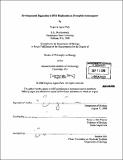Developmental regulation of DNA replication in Drosophila melanogaster
Author(s)
Park, Eugenia Agnes
DownloadFull printable version (23.39Mb)
Alternative title
Developmental regulation of deoxyribonucleic acid replication in D. melanogaster
Other Contributors
Massachusetts Institute of Technology. Dept. of Biology.
Advisor
Terry L. Orr-Weaver.
Terms of use
Metadata
Show full item recordAbstract
In mitotic cell cycles, the genome must be replicated fully in each cell cycle to ensure the normal complement of chromosomes. Failure to replicate chromosomes fully or a failure to limit replication to once-per-cell-cycle may lead to aneuploidy and genomic instability. Variants of the archetypal mitotic cell cycle, utilizing conserved cell cycle machinery, are employed during metazoan development to achieve different aims. Endocycles, in which the cell cycle proceeds without complete mitosis, generate polyploidy and are commonly employed to increase metabolic capacity and cell size. D. melanogaster follicle cell gene amplification, in which bi-directional replication occurs in the absence of detectable gap phases, serves to produce large amounts of eggshell proteins and may also serve to regulate transcription. During D. melanogaster embryogenesis, mitotic cell cycles, endocycles and cell cycle exit occur concurrently. We undertook a screen to identify factors affecting developmentally regulated, variant cell cycles during D. melanogaster embryogenesis. We identified a class of mutants with apparently polyploid cells in normally diploid tissues indicating a failure to maintain mitotic cycles. (cont.) In this class of mutants, we identified and characterized new mutants in pavarotti and tumbleweed, pav3C53 and tum32a-20. These mutants displayed phenotypic defects consistent with failures in cytokinesis. In particular, tum32a'20 displayed multinucleate cells and abnormal telophase spindles. We also describe the identification, cloning and characterization of the first cyclinE mutant to undergo aberrant gene amplification, cyclinE'16. We observed a novel gene amplification defect, dramatically increased replication fork progression in cyclinE1f36/cyclinEP28 and cyclinE1f36/cyclinEP28 follicle cells implicating CyclinE in the regulation of replication fork speed.
Description
Thesis (Ph. D.)--Massachusetts Institute of Technology, Dept. of Biology, 2006. Includes bibliographical references.
Date issued
2006Department
Massachusetts Institute of Technology. Department of BiologyPublisher
Massachusetts Institute of Technology
Keywords
Biology.